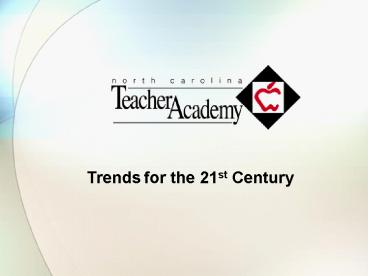Trends - PowerPoint PPT Presentation
1 / 17
Title:
Trends
Description:
... doing homework, playing games online and watching TV, I predict, aren't going to ... you're IMing four friends while watching That '70s Show, it's not the ... – PowerPoint PPT presentation
Number of Views:200
Avg rating:3.0/5.0
Title: Trends
1
Trends for the 21st Century
2
21st Century Literacy
- Information Literacy
Technology Literacy
Global Awareness
Economic Literacy
Civic Literacy
Thinking Skills
Cultural Competency
Life Skills
3
On the Verge of a breakthrough!
4
1500
5
1970
6
Students in the 21st Century are digital natives
who speak the language of technology as their
first language. They do not know when they
learned to use technology because they were
born knowing how. Teachers are not digital
natives and while they can learn to use the
tools, they will always speak technology with
an accent. So the question stands Where do
we go from here?
7
Every generation of adults sees new as a threat
to the rightful order of things Plato warned
(correctly) that reading would be the downfall of
oral tradition and memory. And every generation
of teenagers embraces the freedoms and
possibilities wrought by technology in ways that
shock the elders just think about what the
automobile did for dating.
8
However ..
- Kids that are instant messaging while doing
homework, playing games online and watching TV, I
predict, aren't going to do well in the long
run," says Jordan Grafman, chief of the cognitive
neuroscience section at the National Institute of
Neurological Disorders and Stroke (NINDS).
9
Difficult to Focus
- Teenagers who fill every quiet moment with a
phone call or some kind of e-stimulation may not
be getting that needed reprieve. Habitual
multitasking may condition their brain to an
overexcited state, making it difficult to focus
even when they want to.
10
Output and Depth of Thought
- Decades of research (not to mention common
sense) indicate that the quality of one's output
and depth of thought deteriorate as one attends
to ever more tasks
11
Multitasking
- The switching of attention from one task to
another, the toggling action, occurs in a region
right behind the forehead called Brodmann's Area
10 in the brain's anterior prefrontal cortex.
Brodmann's Area 10 is part of the frontal lobes,
which "are important for maintaining long-term
goals and achieving them. The most anterior part
allows you to leave something when it's
incomplete and return to the same place and
continue from there. This gives us a "form of
multitasking though it's actually sequential
processing.
12
Toggling
- It may seem that a teenage girl is writing an
instant message, burning a CD and telling her
mother that she's doing homework--all at the same
time--but what's really going on is a rapid
toggling among tasks rather than simultaneous
processing. "You're doing more than one thing,
but you're ordering them and deciding which one
to do at any one time.
13
Simulation
- Some are concerned about the disappearance of
mental downtime to relax and reflect. Roberts
notes Stanford students "can't go the few minutes
between their 10 o'clock and 11 o'clock classes
without talking on their cell phones. It seems to
me that there's almost a discomfort with not
being stimulated.
14
Human Physical Communication
- If you're IMing four friends while watching
That '70s Show, it's not the same as sitting on
the couch with your buddies or your sisters and
watching the show together. Or sharing a family
meal across a table. Thousands of years of
evolution created human physical
communication--facial expressions, body
language--that puts broadband to shame in its
ability to convey meaning and create bonds.
15
So
- We are back to the questions-
- Where do we go from here?
- What are viable trends for the 21st Century?
16
(No Transcript)
17
Resources for thisPowerPoint can be found
at the Trends Websitehttp//www.teacheracademy.o
rg/trends































